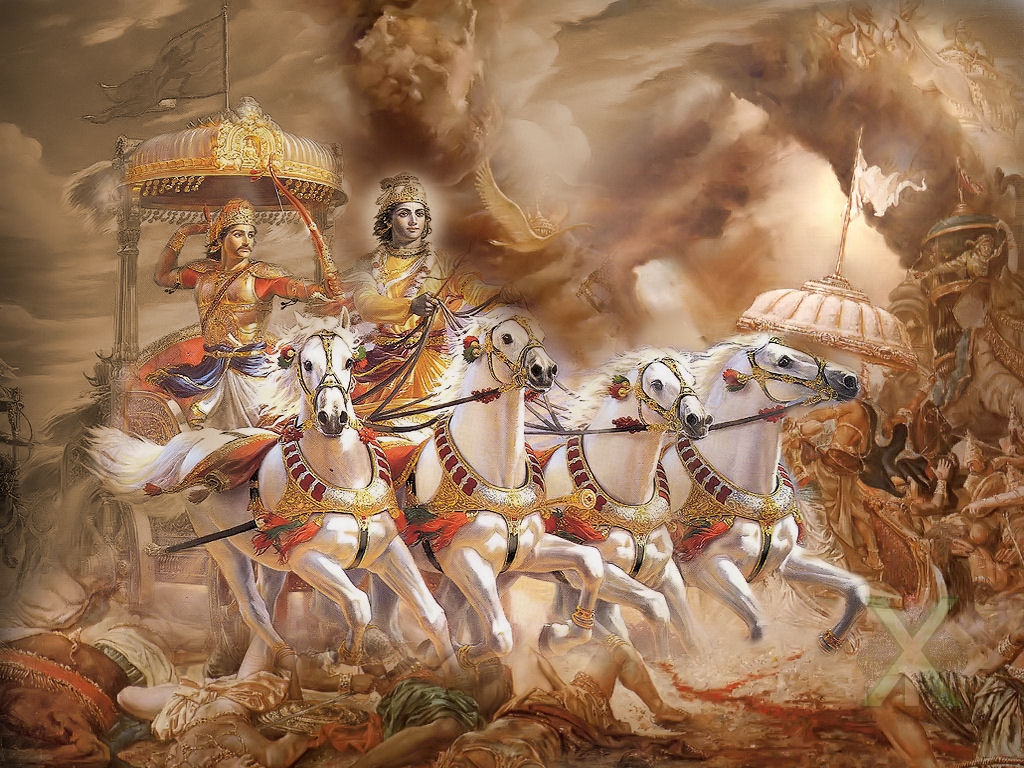Mahabharata is one of the two great Indian epics, the other being Ramayana, and is considered to be one of the foundational texts of Hinduism and includes the much revered Srimad Bhagwad Gita. However, Mahabharata is not just a religious text but also deals with several other aspects of human life including social norms and statecraft. When we talk of religion, we tend to expect the language of universal peace, harmony, brotherhood, righteous conduct and morality. But Mahabharata does not prescribe selfless moral conduct, particularly when it comes to statesmanship. The Mahabharata stands for pragmatic statesmanship and does not shirk from advising the king to employ deceitful means to preserve the independence of his kingdom and ensure the well-being and prosperity of his people.
When Narad, the saint among the gods, visits Emperor Yudhishthira, he enquires if all is well with the Kingdom and the King, and what he enquires about indicates what is desirable in a King, his Kingdom and the way he conducts the royal affairs. He addresses Yudhishthira thus:
O sinless one, with the six attributes of kings ( viz. cleverness of speech, readiness in providing means, intelligence in dealing with the foe, memory, and acquaintance with morals and politics), thou attend to the seven means ( viz. sowing dissensions, chastisement, conciliation, gifts, incantations, medicine and magic)?
A king has to be clever of speech. It does not mean that he has to be sweet or always tell the truth or should be ‘noble’ of speech. It means that he should be able to say exactly what he wants to convey using the language and tone befitting the one addressed and as warranted by the circumstances and the context. He must be pleasant when the need be and firm even to the extent of being rude when required. Furthermore, when Narad asks of the King to be ‘clever’ of speech, he also means that the king must only make promises he could keep and tactfully avoid making promises that are difficult or inexpedient to keep without sounding rude in sidestepping the request. In other words, the king must always be in control of his words and their full contextual import so that his words are always valued without his having to make regretful compromises for having over-promised.

“Readiness in providing means” is another indispensable requirement. This attribute flows from the king’s being the ultimate guardian and the greatest provider. Anything that is worthy of being done must be done and the king must always be ready and willing to supply the means. It is important to note that Narad’s king is not only seen by the masses as someone who could provide protection when needed and is approached in case of an encroachment or violation to punish the guilty, but is also the one who could be approached to supply the means when no other option is available. What is requested may not be for public purpose because ideally a king would already take care of all public needs before it is brought to his notice by the aggrieved people. So, it is very likely that Narad is talking of king’s inclination to provide assistance in fulfilling private needs of the individuals on ex-gratia basis. It must be noted that it is the ‘readiness’ that Narad is concerned with, and not the providing of means itself. So, the king may or may not provide the means in all cases, but he must always be ready and willing to do so.
The king must always display “intelligence in dealing with the foe”. All enemies are not alike and having a uniform approach to all of them could be counterproductive to the extent of being suicidial for any king. Therefore, enemies must only be dealt with after proper application of mind and only after taking into account the pros and cons of all proposed ways. The king must also be capable of making a distinction between personal enemies and political enemies because their enmity is not of the same kind and the same or even similar approach to both could be disastrous. Besides, overt enmity is not always in the best interest of State and the king must be tactful in avoiding open hostilities unless it serves a purpose. The king must always bear in mind that his actions could adversely affect the welfare of his people, which is why he must have a balanced and expedient approach to his enemies.
“Memory and acquaintance with morals and politics” is another requirement. Morals are very dear to the masses. Therfore, the king must be alive to them at all times and must find ways so as to run the political affairs without breaching the sense of morality of the people. In other words, king’s politics must always appear moral or amoral but never immoral.
It is often seen that despite an action’s expediency, it is judged on moral grounds by the people and even if a particular action is the most practical way out, it is never looked upon as the completely clean regardless of the result or the actor. For instance, Lord Ram is considered to be the incarnation of Lord Vishnu himself, but his slaying of Bali from a hiding place has always been considered morally questionable despite the well-known fact that it was not possible to defeat Bali in a straight combat because he was blessed with the attribute that half of the strength of his immediate opponent would get transferred to him in any battle. He was to be eliminated in the interest of Dharma, as he was a cruel and immoral king, but the way he was killed-which was in fact the only possible way-is always seen as morally wrong.
So, Narad insists that as far as possible a king must adhere to morals and appear to be just and right at all times. A king might have to resort to immoral means at times, but it seems Narad would want it to be covered up because although he is supportive of moral conduct on part of the king, he does not seem to value it over and above stability and order. Therefore, if the choice is between moral and immoral and peace and order is at stake, Narad would want the king to take the course that best serves to maintain order and promote peace.
Apparently, in Narad’s scheme of things morality of purpose is more significant than the morality of means. Therefore, so long as the purpose of an action is consistent with Dharma and promotes the welfare of the people, it is permissible for the king to resort to immoral means provided there is no morally clean way of accomplishing the same objective.
Originally published as part of Thinkers and Theory series in Lawyers Update in February 2013.





